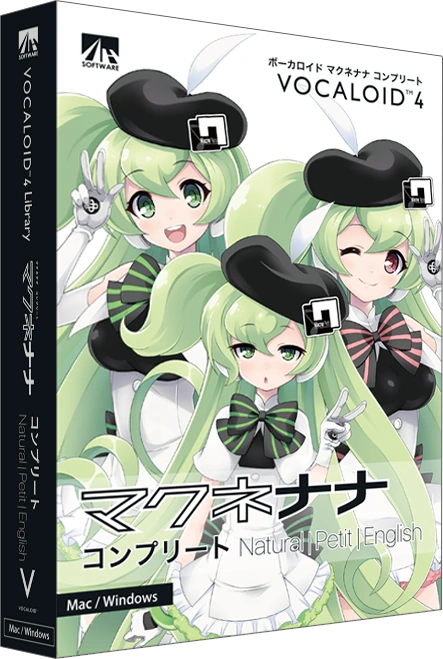Vocaloid Com English
| Developer(s) | Yamaha Corporation |
|---|---|
| Initial release | January 15, 2004 |
| Stable release | |
| Operating system | Windows XP / Vista / 7 Apple iOS (iVocaloid, Japan Only) |
| Available in | English, Japanese, Spanish, Korean, Chinese |
| Type | Musical Synthesizer Application |
| License | Proprietary |
| Website | vocaloid.com |
LEORA is a French-English Alter/Ego voicebank produced by VoxWave with collaborative efforts by Chorical. Debuting in 2016, with a beta release in 2017, her full release is drawing near after a total of 4 years in development time. Get JubyPhonic covers only available to Patreon. The covers can include anime, vocaloid, and even popular american songs. These will be casual covers (recorded only once or twice) in either native Japanese or English. I'll be continually adding to this collection. I take Vocaloid songs and sing them.
Vocaloid is a music software that's used to make vocals for music. It was created by Yamaha, a company that sells musical instruments, as well as other products. The user can type in lyrics and a melody and it will synthesize singing. Voicebanks for Vocaloid are made by recording samples of singers.[1]
Vocaloid was developed partially through a research project led by Kenmochi Hideki. The people involved in this project later created the company Voctro Labs. Vocaloid was originally not supposed to be a commercial product, but with the help of Yamaha, became the program we know today.
Vocaloid originally only had an English version available, with two English voicebanks, Leon and Lola, being released for it. This changed later on with the release of Kaito and Meiko, which were both Japanese voicebanks.

Vocaloid is meant both for professional and amateur music makers, since Vocaloid is easy to use, so the only limit is the user's skill. Music groups like Livetune and Supercell have made music using Vocaloid voicebanks.
Vocaloid English Voicebank
Technology[change | change source]
Vocaloid works by taking samples of singers and separating them into parts. These parts are used to form words. Vocaloid voices can be made to sound more realistic by using vibrato and changing things like how breathy a voice sounds.
History[change | change source]

Vocaloid[change | change source]
Yamaha started working on Vocaloid in 2000. They announced it at a German music festival. Vocaloid was originally nicknamed 'Daisy' as a reference to the song 'Daisy Bell', but eventually they got rid of that name and decided to use 'Vocaloid' instead.
Vocaloid 2[change | change source]
Vocaloid 2 was announced in 2007. The way vocals were synthesized was changed, and so was the way the program looked.
Vocaloid 3[change | change source]
Vocaloid 3 was released on October 21st, 2011. A lot of companies that made voicebanks for Vocaloid 2 upgraded their voicebanks to Vocaloid 3 because it sounded better.
Vocaloid 4[change | change source]
Vocaloid 4 was released in 2015, and added a feature which let voicebanks made specifically for Vocaloid 4 sound like they were growling.
Vocaloid 5[change | change source]
Vocaloid 5 was released in 2018, with an overhauled user interface and substantial engine improvements.
References[change | change source]

- ↑'Could I Get That Song in Elvis, Please?'. The New York Times. 23 November 2003. Retrieved 30 December 2016.
Other websites[change | change source]
- Official website(in Japanese)
- Official website (in English)
N/A
- Daily visitors
N/A
- Daily pageviews
N/A
Website is generally safe
Voctro-vocaloid.com: visit the most interesting Voctro Vocaloid pages, well-liked by users from your country and all over the world, or check the rest of voctro-vocaloid.com data below. Voctro-vocaloid.com is a web project, safe and generally suitable for all ages. We found that English is the preferred language on Voctro Vocaloid pages. Their most used social media is Facebook with about 99% of all user votes and reposts. Voctro-vocaloid.com is built on WordPress and uses Nginx for server.
dzMAIKA's [I0] corresponds to English VOCALOID's [I], whereas MAIKA's [I] is used in falling diphthongs such as [a I].MAIKA's [r] corresponds to an English [r].MAIKA's [j] is generally equivalent...
tSBruno and Clara's [j] is generally equivalent to her [j] (which is preferred); typically [j] is only used in words starting in 'y-' or 'hie-'.For more information see: phoneme chart with example...
Vocaloid Software Free
SERVER network INFO
| 54.77.137.245 | |
Hosting provider: | Amazon Technologies Inc. |
Vocaloid English Phonemes
DOMAIN
| Registrar: | DreamHost, LLC |
| Registrant: | Proxy Protection LLC |
| Updated: | September 02, 2019 |
| Expires: | September 30, 2020 |
| Created: | September 30, 2011 |

voctro-vocaloid.com is built with
WHOIS DATA
